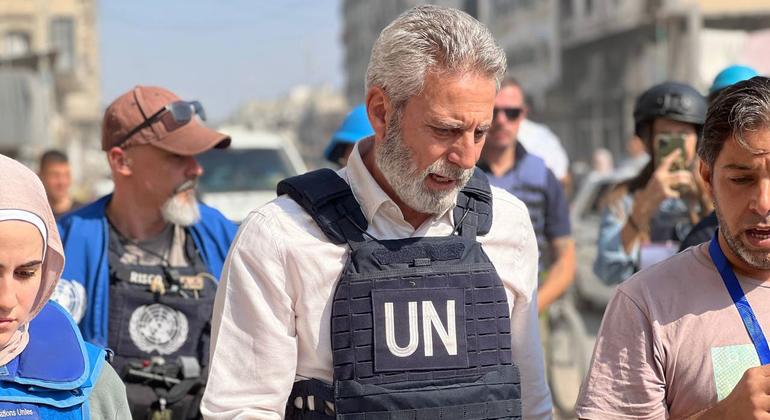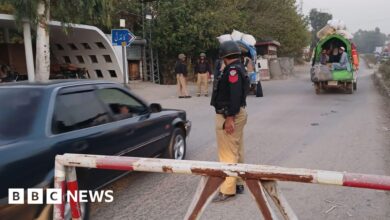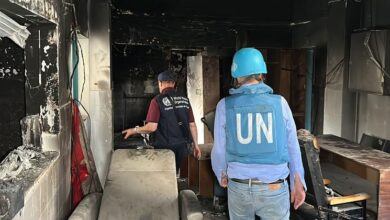Unbearable conditions in northern Gaza ‘beyond imagination’

Muhannad Hadi spoke to UN News from Al-Mamouniya School in Gaza City run by the United Nations agency supporting Palestinian refugees, UNRWA.
Like the rest of UNRWA’s schools that survived as the war continued, it now serves as a refuge for displaced people seeking safety in the besieged area, which is nowhere to be found. safe.
‘Unbearable’ situation
“This is not a place for humans to survive,” he said. “This must end. This misery must end. This war must end. This is beyond imagination.”
Mr. Hadi said that what he saw was “very different” from what he saw in northern Gaza in September.
“At this school, I have seen families and people relying on each other. It’s unbearable here. I cannot imagine how those people survived,” he said.
“There were 500 people at this school in September and now there are over 1,500 people. There is no access to the bathroom. There is a food shortage. The situation is unbearable. Wastewater is everywhere. Waste is everywhere. There is trash everywhere.”

Old schools continue to be used as shelters for displaced people in the northern Gaza Strip.
‘Just water and lentils’
From the damaged school’s second-floor window, mountains of trash piled up in the yard could be seen – a symbol of the enormous health hazard and harsh conditions faced by those inside.
Vital supplies including food are scarce in northern Gaza. As Mr. Hadi walked around the school, whose structure was damaged by the bombing, he encountered a man preparing lentil soup for his family.
Mr. Hadi learned that the lentils had been provided by UNRWA and that the small pot the man brought was said to be able to feed 12 people.
“Just water and lentils, no garlic or onions,” he commented, noting that “a chili today costs 10 shekels.”
‘We want to have fun’
The senior UN official also visited a temporary learning space called Al-Nayzak on Al-Jalaa Street. Tents have been set up on the destroyed road to provide minimal education and a safe place for local children to cope with the horrors they have endured since the war broke out. in October last year.
At the temporary school, 11 teachers – male and female – provide courses in Arabic, English, math, science and psychosocial support to 510 students.
Mr. Hadi plays with young children, from three to five years old. Many children should have gone to kindergarten, but the war deprived them of the opportunity to learn in a real classroom.
He meets a girl who says she lost her parents and home in the war, and is now living with her cousins who have also become orphans. Her school used to be located near the Al-Nayzak learning complex, but like most schools in Gaza, it was destroyed by shelling.
The girl told him that when they have the opportunity, they cook at home but often ask humanitarian organizations to provide meals. When Mr. Hadi asked her what she wanted to do when the war ended, she replied:“We want to have fun, enjoy ourselves and go where we want.”
The UN’s top humanitarian official also visited the headquarters of the Atfaluna Deaf Children’s Association, where students taught him sign language.
The association provides lessons in English, Arabic, math, science, physical education and art to 35 children, some of whom are learning to cope with new disabilities after losing their hearing due to heavy shelling.

Muhannad Hadi (right), United Nations Humanitarian Coordinator in the Occupied Palestinian Territory visits the northern Gaza Strip.
Stop the war
Mr. Hadi said UN News that he had heard terrible stories from people he met in northern Gaza and emphasized the need to end the war.
“What people are going through here, no one can endure. Those are the victims of this war. Those are the people who are paying the price for this war – the children around me here, the women, the elderly,” he said.
Heads of 15 United Nations and international humanitarian organizations has recently been confirmed that “the entire Palestinian population of Northern Gaza is at imminent risk of death from disease, famine and violence.”
Officials said humanitarian workers were not safe to do their work, and that Israeli forces and insecurity prevented them from reaching those in need.
According to the Gaza Ministry of Health, since the war began in October 2023, more than 43,000 Palestinians have been killed and 100,000 injured.
The United Nations estimates that more than 1.9 million people have been forced from their homes in the region, many of whom have repeatedly had to flee from one unsafe place to another.




